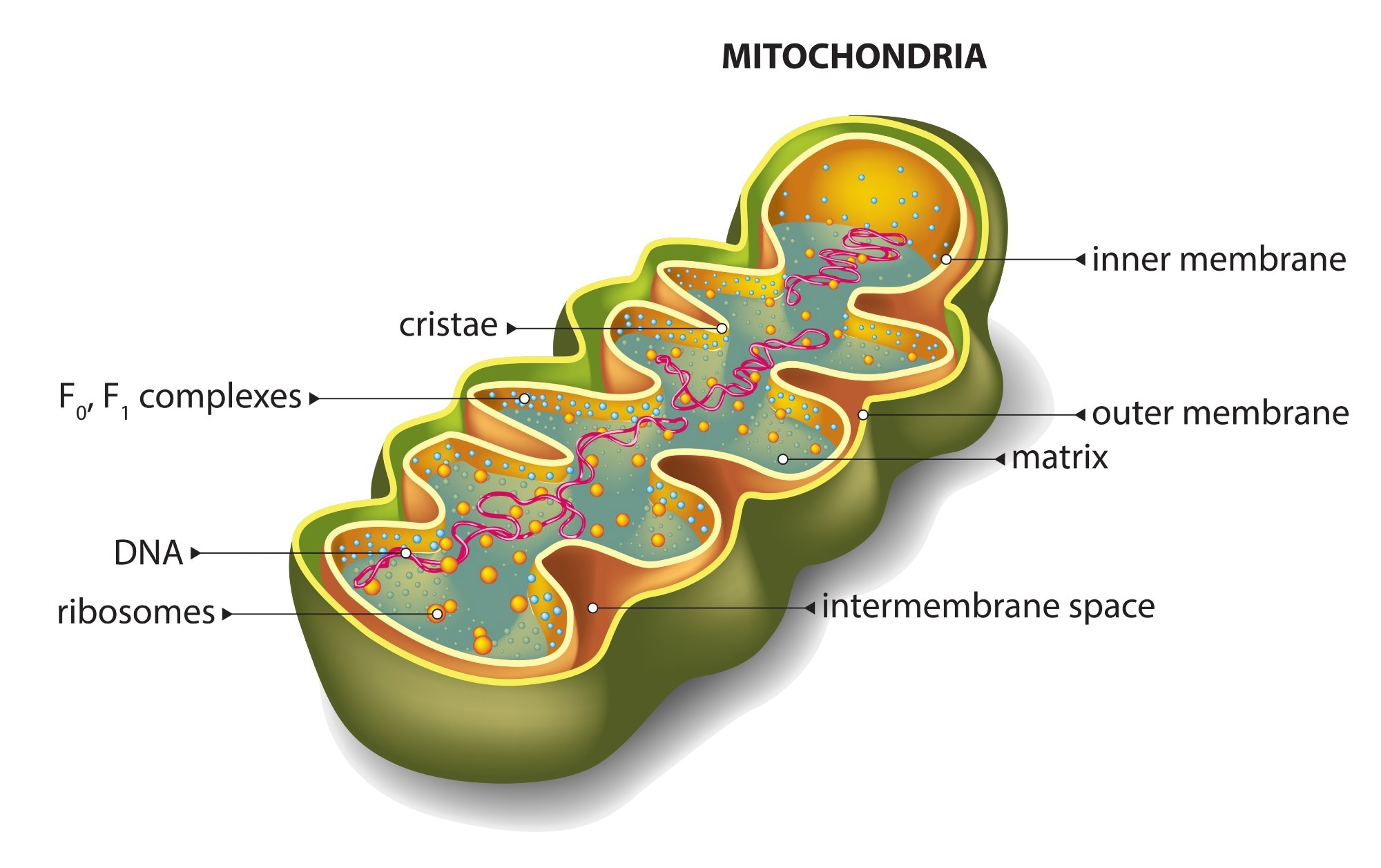Understanding mitochondria
Mitochondria and nutrition: a deeper connection
Mitochondrial dysfunction and health implications
The role of mitochondria in aging and longevity
Dietary strategies to support mitochondrial health
Future directions: mitochondria in medical research
References
Further reading
The mitochondria, the powerhouse of the cell, plays a surprising role in diet and health since its function in energy production directly influences body metabolism, that are also involved in aging and longevity.
Understanding mitochondria
The history of mitochondria begins with the endosymbiotic theory, which posits that mitochondria were primitive bacteria that entered into a mutually beneficial relationship with larger cells.1 Despite the lack of intermediates bridging prokaryotes and eukaryotes, mitochondria's unique DNA reflects its bacterial ancestry.1 However, the exact ecological conditions that led to this partnership remain the subject of intense debate.
Mitochondria are involved in processes such as nutrient metabolism and utilization, cellular signaling, oxidative stress, and antioxidant defense.2 However, their best-known function is the production of energy for the cell.3 This process is called oxidative phosphorylation.
Oxidative phosphorylation produces ATP, which are high-energy molecules used by cells.3 Depending on the energy demand, more mitochondria are present (e.g., muscle cells).3

Section of mitochondria. Image Credit: EreborMountain/Shutterstock.com
Mitochondria and nutrition: a deeper connection
The diet provides macronutrients (carbohydrates, lipids, and proteins), and they are needed to produce energy, cellular components, and structures indispensable for cellular functions.3
For example, some dietary strategies encourage the consumption of healthy fats that promote mitochondrial health.3 On the other hand, calorie restriction or intermittent fasting can increase its efficiency by drawing the necessary resources from the body's stores.3
Nutrients such as vitamins B, iron, selenium, and coenzyme Q10 obtained in the diet are also important for supporting mitochondrial function and energy production.3 In addition to their critical role in energy production, mitochondria also play a key participation in the intracellular regulation of calcium, cell death, and redox balance.3
Explore More Diet & Nutrition Articles Here
Mitochondrial dysfunction and health implications
Various etiologies, including genetic mutations, infections, aging, and lack of physical activity, can lead to mitochondrial dysfunction, which in turn influences the mechanisms of various diseases.2
Mitochondrial dysfunction in brain cells contributes to the occurrence of Alzheimer's disease (where impaired function leads to accumulation of beta-amyloid plaques), Parkinson's disease (where impaired metabolism results in loss of dopaminergic neurons), and Huntington's disease (where abnormal protein aggregation disrupts mitochondrial function). 2
In metabolic diseases such as diabetes, diminished mitochondrial function in pancreatic beta cells can affect insulin secretion, leading to insulin resistance.2 In obesity, mitochondrial dysfunction in adipose tissue can disrupt the balance between energy intake and expenditure, thus increasing the risk of obesity. 2
Current research focuses both on enhancing mitochondrial function and understanding the mechanisms leading to the onset of specific diseases. For instance, the use of antioxidants such as mitoQ, which reduce damage or increase the biogenesis of this organelle through signals activated during exercise or by using chemical compounds, is being explored.4
The role of mitochondria in aging and longevity
Mitochondria play a pivotal role in aging and longevity due to their central functions in energy production, cellular signaling, and regulation of cell death.
As organisms age, mitochondrial function tends to decline.5 This decline is characterized by a decrease in the efficiency of the electron transport chain, leading to a reduction in ATP production and an increase in the leakage of electrons, which can form reactive oxygen species (ROS).5 These ROS can cause oxidative damage to mitochondrial DNA, proteins, and lipids, leading to further mitochondrial dysfunction and a vicious cycle of damage and inefficiency.5
Moreover, mitochondria play a role in the regulation of apoptosis.5 Dysfunctional mitochondria can trigger cellular pathways that lead to apoptosis, which can contribute to the degeneration of tissues and organs as part of the aging process.5
On the contrary, longevity is often associated with enhanced mitochondrial function and resistance to oxidative stress.5 Caloric restriction, exercise, and certain genetic factors that promote mitochondrial health have been linked to increased lifespan in various organisms.5
Exercise and a healthy diet have been associated with ROS reduction and improved repair and turnover of damaged mitochondria through processes like mitophagy, potentially slowing down the aging process.5
Dietary strategies to support mitochondrial health
To support mitochondrial health, certain dietary choices need to be made.6 This starts by limiting the consumption of highly processed foods and promoting the consumption of legumes, fruits, nuts, seeds, and high-fiber foods. 6 It's also essential to include sources of unsaturated fats such as avocado, salmon, and olive oil. 6 Adequate protein intake and consumption of micronutrients such as vitamin C, B vitamins, and magnesium are vital. 6

Selection of healthy food for heart, life concept. Image Credit: Antonina Vlasova/Shutterstock.com
These dietary choices need to be tailored individually, as energy requirements vary from person to person. 6
Another strategy involves the adoption of the ketogenic diet, a high-fat, low-carbohydrate diet that induces a state of ketosis, where the body uses ketones as fuel instead of glucose. 6
This diet can reduce oxidative stress, enhance mitochondrial biogenesis, and improve efficiency in ATP production. 6 However, this diet should be complemented with certain nutritional supplements to avoid potential metabolic complications such as ketoacidosis, hypoglycemia, and hyperlipidemia. 6
Future directions: mitochondria in medical research
Research in the field of mitochondrial health encompasses a broad spectrum of areas, from genetic editing to the evaluation of the microbiome and its influence on mitochondrial functions.7 Numerous clinical studies are leveraging the CRISPR-Cas9 system to modify genes within the mitochondria with the aim of enhancing their function or altering genes that contribute to certain metabolic diseases.7
Additionally, the process that governs the generation of mitochondria is under investigation, with the goal of augmenting this process in patients suffering from specific diseases such as skeletal muscle disorders and Parkinson's disease, where alterations in mitophagy are observed.2,8
A diet designed to improve mitochondrial health could be personalized, given that nutritional requirements vary among individuals. It is also crucial to understand how certain nutrients, when consumed in appropriate quantities, contribute to the functioning of the mitochondria. 2,8
From a medical perspective, many studies are still in preliminary stages.8 However, the majority of these studies concentrate on early diagnosis and intervention, optimization of existing treatments, and the development of therapies that target the mitochondria directly.8
References
- Zachar I, et al. (2017). Breath-giving cooperation: critical review of origin of mitochondria hypotheses. Biology Direct, 12(1). https://doi.org/10.1186/s13062-017-0190-5
- San-Millán I. (2023). The Key Role of Mitochondrial Function in Health and Disease. Antioxidants, 12(4), 782. https://doi.org/10.3390/antiox12040782
- Picard M, et al. (2016). The rise of mitochondria in medicine. Mitochondrion, 30, 105–116. https://doi.org/10.1016/j.mito.2016.07.003
- The Best Foods for Supporting Your Mitochondria | MitoQ. (n.d.). MitoQ. [Online] https://www.mitoq.com/journal/which-foods-help-your-mitochondria
- Srivastava S. (2017). The Mitochondrial Basis of Aging and Age-Related Disorders. Genes, 8(12), 398. https://doi.org/10.3390/genes8120398
- Kyriazis I, et al. (2022). The impact of diet upon mitochondrial physiology (Review). International Journal of Molecular Medicine, 50(5). https://doi.org/10.3892/ijmm.2022.5191
- Gammage, P. A, et al. (2018). Mitochondrial Genome Engineering: The Revolution May Not Be CRISPR-Ized. Trends in Genetics, 34(2), 101–110. https://doi.org/10.1016/j.tig.2017.11.001
- Bernardi P, et al. (2021). Mitochondria in Health and Disease. Frontiers Research Topics. https://doi.org/10.3389/978-2-88971-251-9
Further Reading
Last Updated: Mar 19, 2024